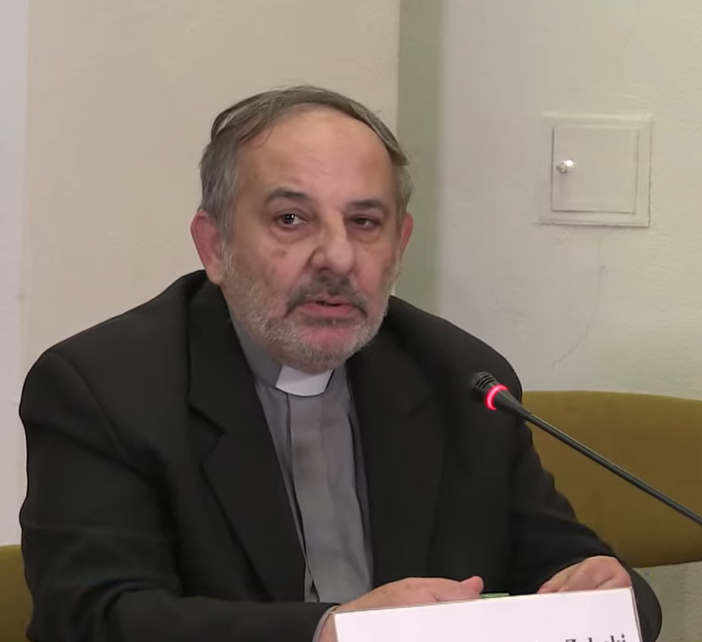
“The ban on burial is against all international laws” – Fr. Tadeusz Isakowicz-Zaleski, Custodian of National Remembrance, chaplain of borderland communities noted during KAI conference in Warsaw devoted to Polish-Ukrainian reconciliation, pointing out that “Ukraine, if it wants to aspire to the European Union and NATO, which I personally do not oppose, is a matter for politicians, it cannot continue to blackmail the Polish side that if something If you don’t, we forbid you”. “This is barbarism” – he concluded, referring to the position of the Ukrainian side prohibiting the exhumation of victims of genocide carried out by Ukrainian nationalists on the Polish population of Volhynia and Eastern Lesser Poland.
Fr. Tadeusz Isakowicz-Zaleski read out a letter from the families of the victims, which was signed by about 30 organizations associating the victims of genocide and their families. The letter begins with a quote that has been the motto of families for at least 20 years: “The victims of genocide cry for remembrance and truth, not for revenge”.
He pointed out that the reference to the letter of Polish bishops to German bishops from 1965 is completely unrealistic in the current situation of Polish-Ukrainian relations. “With the ban on the burial of victims and the glorification of criminals, it is difficult to say that we forgive and ask for forgiveness, because for what purpose could such words be said” – said Fr. Tadeusz Isakowicz-Zaleski.
“Secondly, the ban on burial is against all international laws” – he noted, pointing out that “if Ukraine wants to aspire to the European Union and NATO, which I personally do not oppose, it is a matter of politicians, it cannot continue to blackmail the Polish side, that if you don’t do something, we forbid you”. “This is barbaric” – he concluded. “And even the recent statements of the head of the Institute of National Remembrance in Kiev show that we are subject to this blackmail” – he added.
Fr. Isakowicz-Zaleski noticed that the generation of witnesses was dying out. “Perhaps this is what the Ukrainian side wants, that a certain generation, which both on the Polish and Ukrainian side, remembers these things, die out” – he suggested, emphasizing that “extending it in time and such blackmail is not good”.
“There is a third issue that comes up here, this is an attempt to equate the executioners with the victims. You can stretch it all out that it was the fault of Polish lords, nobles, policemen, etc., but that 95 percent of the victims were Polish peasants, like my grandparents. They did not hold any office in the Polish state. What’s more, they were priests, parish priests, vicars, village teachers. These people had no influence on what was happening in the interwar period. To many causes of genocide it is not added that Ukrainian nationalism carried out a decisive terrorist action in the interwar period. After all, we are in Warsaw, and here Minister Pieracki was murdered, MP Tadeusz Hołówko was murdered. Blaming the Polish state of the Second Polish Republic, that it was the right reason for murdering Polish peasants, burning down the village, is in my opinion very inappropriate. The same applies to dates. The first murders of Poles, not counting the interwar period, because these were acts of terrorism, took place in September 1939, not in Volhynia, but mainly in the Tarnopol and Lviv voivodships. The last year was 1946 and 1947, so closing it to Volhynia and until 1943-45 really gives a false number of victims” – the chaplain of borderland communities said.
“The last thing is the righteous Ukrainians. Some add the Ukrainians murdered by the Banderites to the victims who died at the hands of the Polish. Of course, there were reprisals, there were revenge, there were local actions, because the murder provokes a reaction, but in no way can it be said that all The Ukrainians who died were victims of the Home Army, very often the victims of genocide” – he pointed out.
“One should also remember about those Ukrainians who did not support the UPA (Ukrainian Insurgent Army), who saved Poles and were often murdered for it. A separate matter is the purges in families, where the husband, a Ukrainian, was ordered to murder his wife, a Pole, or a son or daughter in these mixed marriages” – he reminded.
Fr. Isakowicz-Zaleski objected to the use of euphemisms in relation to the murders committed by Ukrainian nationalists on Poles in Volhynia.
“You have to write the truth. There was genocide. It is not the whole Ukrainian nation that is responsible for the genocide, but a part of this nation, the ulcer that arose, and that Poles were murdered, and Jews were murdered, and Armenians and Czechs. So it was not just a Polish-Ukrainian relation” – he concluded.
“I hope that further dialogue, which is changed here by all possible cases, will be conducted in the future with the participation of the families of the murdered, including Jewish communities, including those Ukrainians who died at the hands of the UPA” – he added.
According to various estimates, a total of 100,000 to 200,000 people died at the hands of Ukrainian nationalists. Poles. Ukraine continues to block the possibility of exhuming the victims and honoring their tormentors. Poland wants reconciliation, but reconciliation based on truth and the cessation of paying homage to genocide.
Anna Wiejak
